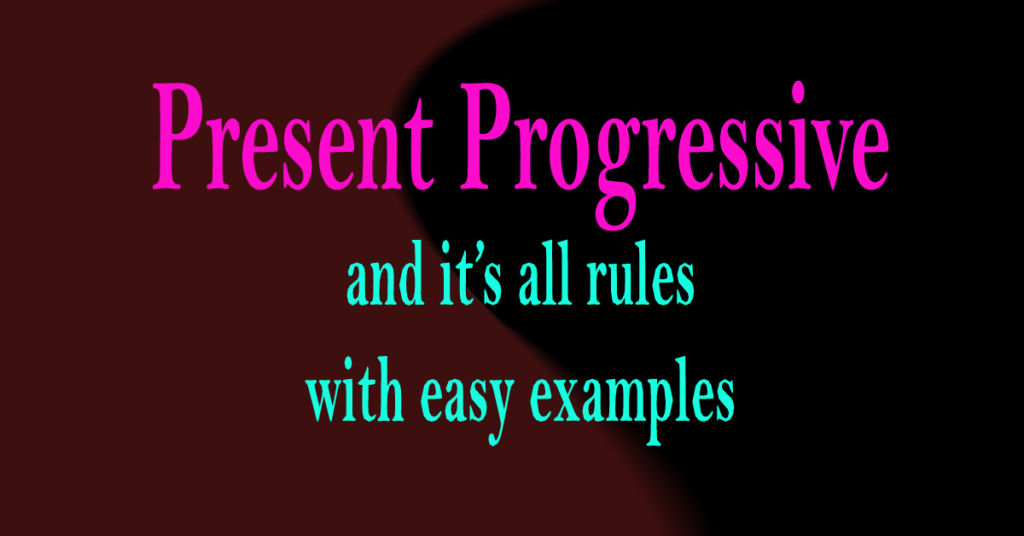PRESENT PROGRESSIVE or PRESENT CONTINUOUS (Intermediate Level)
We have already learned Present Progressive forms, formulas, etc., in Present Progressive (Basic Level) or in (Step-13). Here we will learn detail about Present Progressive and its all rules. As you know in Present Progressive the main verb is in the ‘ing’ form. It is used with a ‘be’ verb before it. The form of the ‘be’ verb depends on the number and person of the subject. Look at the following examples;
Affirmative Sentence of PRESENT PROGRESSIVE
| I am reading. You/They/We are reading. He/She/It is reading. |
Negative Sentence of PRESENT PROGRESSIVE
| Negative: I am not reading.You/They/ We are not working.He/She/It is not reading. Short form: I’m not reading. Or, You/They/We aren’t reading. Or, He /She/It isn’t reading. |
Questions or Interrogative of PRESENT PROGRESSIVE
| Am I reading? Are you/ they/we reading? Is she/he/it reading? |
You will notice that in the question sentence, only the ‘be’ verb comes to the first position of the sentence.
How to add ‘ing’ to the main verb?
We add ‘ing’ to most verbs directly without changing the base form:write-writing, go-going, wait-waiting.
- If a verb ends with ‘-e’, we remove ‘e’ and add’ -ing’ to the rest; ride-riding, move-moving.
- If a verb ends with a single consonant having a single vowel before it, the last consonant usually doubles; sit –sitting.
- If the last two letters of a verb are –ic, they change to ‘ick´ before we add ‘ing’ picnic –picnicking –and –ie changes to ‘y’ : lie-lying.
RULES OF PRESENT PROGRESSIVE OR CONTINUOUS
We use the Present Progressive talk about an action/situation which is in progress at the time of speaking ‘or’ over a period of time around it. The verb tells us that the action is still happening or the situation is still changing. Let’s see in what different situations we use them.
PRESENT PROGRESSIVE OR CONTINUOUS RULE-1
We use the Present Progressive to talk about an action that is going on at the time of speaking. Such actions may continue for a short time before they end.
- It is raining now.
- Don’t disturb her; she is reading.
- I am looking at the bird.
- We are waiting for the bus.
- Who is dancing there?
PRESENT PROGRESSIVE OR CONTINUOUS RULE-2
We use the Present Progressive to talk about an action that may not be happening at the time of speaking, but happening over a long period around below.
- I am looking for a job.
- Mr. Khan is writing a story book.
- Monika is learning to drive.
- They are building a new house.
- Meera is acting in a film.
In the above examples, the actions started in the past, are in progress now and may remain in progress for sometime in the future.
PRESENT PROGRESSIVE OR CONTINUOUS RULE-3
We use the Present Progressive to talk about an action we do temporarily, but not permanently. For permanent actions, we use the Present Simple. Consider the following examples.
- (a) She goes to school by bus. (Permanent habit)
- But, (b) Today she is going on his cycle. (Temporary action)
- (a) She lives with her parents. (Permanently)
- (b) She is living with us this week because her parents are away. (Temporary action)
- (a) Mr. Patnaik teaches English. (Teaching English is his regular job.)
- But, (b) Mr. Patnaik is teaching us Oriya this week. (as a temporary arrangement)
PRESENT PROGRESSIVE OR CONTINUOUS RULE-4
We use the Present Progressive to talk about a changing situation.
- Prices are going up everyday.
- It is getting hotter gradually.
- More and more people are giving up drinking and smoking.
- Lifestyle is changing very fast.
- The old fellow is becoming weaker and weaker.
PRESENT PROGRESSIVE OR CONTINUOUS RULE-5
We use the Present Progressive to talk about something unpleasant that happens again and again. In such cases, we use the adverbs always, forever, etc. in the sentence.
- Gopal is always borrowing my book.
- My vehicle is always breaking down.
- This dog is always getting into my room.
- This baby is crying for ever.
PRESENT PROGRESSIVE OR CONTINUOUS RULE-6
We also use the Present Progressive to talk about a planned future action. (You will read more about this while reading about the future time in Step-61)
- My elder brother is coming tomorrow.
STATIVE VERBS
Some verbs tell us about our feelings, emotions, opinions, relations, or permanent state. Such verbs are called verbs of state or stative verbs. We normally do not use them in the present progressive except in special cases. We usually use them in the Simple Present form.
Look at the following examples:
- This pen belongs to me. (Not, is belonging to me)
- This packet weighs three kilos.
- The college committee consists of ten members.
- I have a sister. (Not, I am having a sister)
- Dr. Patnaik owns a car.
- I think she is honest.
- I love my family very much.
- The Himalayas stand like a fort. (Permanent state)
Below you will find a list of selected verbs that we normally do not use in the progressive form. Get them by heart. You will read more about them in higher classes.
List of Selected verbs that we normally do not use in the progressive form
| Verbs of Possession: | Hold, Have, own, possess, belong to, contain, consist. |
| Verbs of liking/disliking: | Like, dislike, adore, love, hate, prefer, admire, want. |
| Verbs of Sense perception: | See, hear, smell, taste, feel. |
| Verbs of Thinking: | Think, believe, understand, know. |
| Verbs of Mental activity: | Hope, forget, remember. |
| Verbs of Appearance: | Appear, seem, look (like), resemble |
| Others verbs | Depend, weigh, cost, measure, sound. |
PRESENT PROGRESSIVE EXERCISE-1
Fill in the blanks with the Present Progressive form of the verbs in the brackets.
- Look! a helicopter _______ (fly overhead).
- My brothr______ (write) a letter now.
- What ______ the girl ______ (do) there?
- The boy ______ (not play); she _____ (stand) there now.
- Sumanth usually wears white shirts, but today he ______ (wear) a blue one.
- At present Gourav ____ (work) in a shop.
- The population of the globe ___ (increase) everyday.
- More and more children _____ (go) to school now a days.
- The sky _____ (change) colour gradually.
- He ______ (always find) fault with me.
- Radhika ______ (have) a bath now. She cannot come.
- Gopal ______ (always suffer) from cold.
PRESENT PROGRESSIVE EXERCISE-2
Use the verbs given in brackets either in the Present Simple or the Present Progressive.
- You are sincere. You (do) their homework regularly.
- She (play) cricket everyday. But today she (not play) because she (want) to take a rest.
- She (have) no time to see you now.
- He (wear) a blue frock now; on school days He (wear) the school uniform.
- This jar (contain) rice.
- I (build) a house. I (hope) to finish it in a year.
- This man (grow) fatter every day.
- I (want) to replace this machine because it always (give) me trouble.
- The baby (cry) because its mother (be) not at home.
- I (not understand) what you say.
- This chamber (feel) warm.
- They (run) fast because they are late.
- Reena (resemble) her mother.
- Listen! She (tell) you something.
- I do not talk with him as I (dislike) him.
- I (depend) on you a lot. I (hope) you will help me.
PRESENT PROGRESSIVE EXERCISE-3
| Puspha: Geeta: Puspha: Geeta: Puspha: Geeta: Puspha: Geeta: Puspha: Geeta: | Hello, Geeta! What (you do) these days? Nothing much, I (learn) dancing in a dance school. What about you? Me? I (work) at a training school. The school (give) lessons on cooking. (You like) the job? Yes, of course. I (prefer) this job because I (also learn) a lot about cooking while I (work) there. What they (teach) now? Right now they (give) lessons on Chinese food. You know, Chinese dishes (taste) so good! Can I join the classes someday? Sure! They (want) more and more students to join their school. You are welcome. Thank you. |
“The starting point of all achievement is DESIRE.Keep this constantly in mind. Weak desrie brings weak results, jst as a small fire meakes a small amount of heat.”
-Napolean Hill


